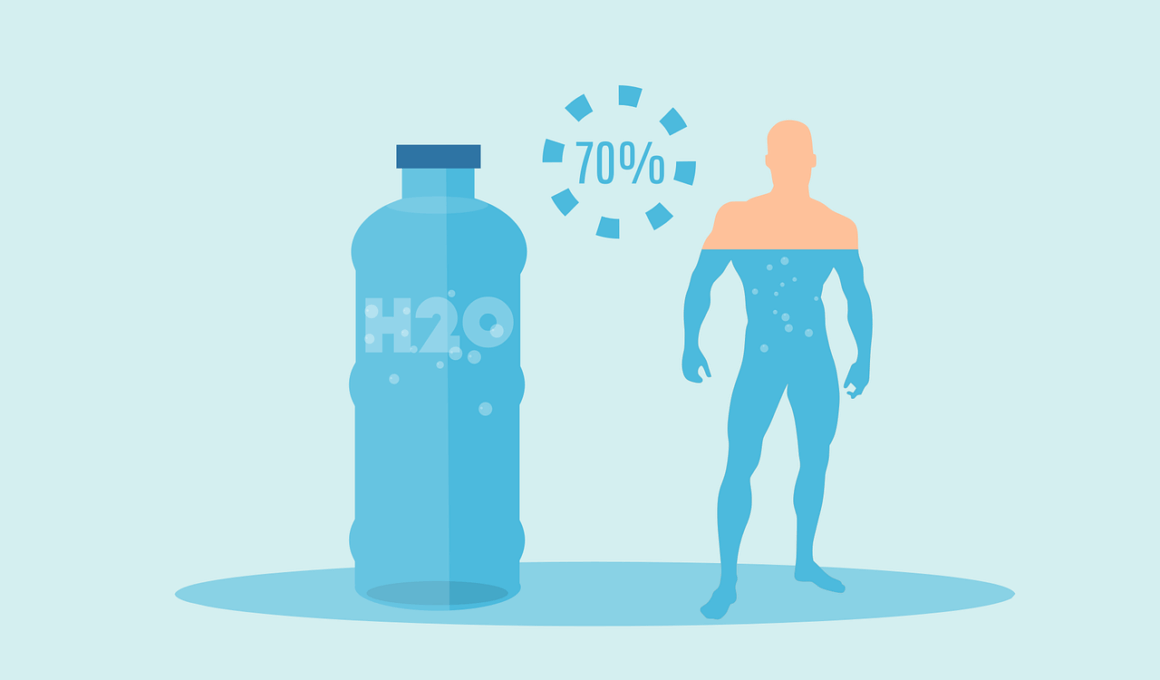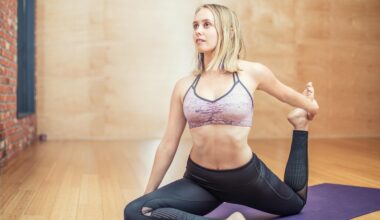Hydration Tips for Martial Artists: Staying at Your Peak
Staying hydrated is essential for martial artists, as water plays a vital role in maintaining peak performance. When training or competing, your body loses fluids through sweat, and this can lead to dehydration, impacting strength, endurance, and focus. To combat dehydration, martial artists should aim to drink water before, during, and after workouts. Additionally, consider factors such as weather and training intensity, as these can influence fluid needs. It’s recommended to drink at least 8-10 cups of water daily, but this will vary by individual. To ensure optimal hydration, try to avoid caffeine and alcohol, as these can dehydrate the body further. Instead, opt for electrolyte-rich drinks to replace lost minerals. Including fruits and vegetables in your meals can also boost hydration, as they naturally contain high water content. Keep a water bottle handy during training sessions and sip regularly. A smart approach includes monitoring urine color as an indicator of hydration status; pale yellow indicates proper hydration while dark yellow suggests you need fluids. In conclusion, prioritizing hydration can enhance your martial arts performance significantly.
Optimal Timing for Hydration
The timing of hydration is as important as the quantity consumed, especially for martial artists. It’s recommended to hydrate before exercise, during training, and after workouts. Prior to training, aim to drink at least 500 ml of water to ensure you’re well-hydrated. This provides your muscles with necessary fluids and helps maintain energy levels. During training sessions, consider sipping water every 15 to 20 minutes to balance fluid loss due to sweat. If you’re involved in an extended session, adding an electrolyte beverage can help replace lost salts and minerals. After training, rehydration is crucial to recovery, particularly if your workout was intense. Immediately post-workout is the best time to rehydrate, as your muscles are primed to absorb fluids effectively. Pay attention to how much you’ve sweated during workouts and adjust your water intake accordingly. Keeping track of your hydration habits can help in optimizing performance. Moreover, consuming foods with high water content can also contribute significantly to your daily intake. In essence, strategically timing your hydration can enhance your martial arts training and competitions.
While plain water is essential for hydration, there are times when specialized hydration options may be beneficial for martial artists. During extended training sessions or competitions, consider consuming sports drinks designed to replenish lost electrolytes. These drinks often contain sodium and potassium, which are crucial for maintaining muscle function and preventing fatigue during intense physical activities. Also, look for beverages low in sugar, as high-sugar options can lead to quick energy spikes followed by crashes. Coconut water is an excellent alternative to sports drinks, as it naturally contains electrolytes and provides hydration without excess sugars. When selecting a drink, be mindful of any allergies or dietary restrictions you might have. Herbal teas can also promote hydration, especially when consumed at a lower temperature. Additionally, adding a squeeze of lemon can enhance flavor while also providing Vitamin C. Building a diverse hydration strategy can keep the process enjoyable and effective. Keep in mind that hydration strategies should complement your overall nutrition, focusing on balance and variety with dietary needs. Water isn’t the only option; varying your hydration approach can yield better performance outcomes.
Signs of Dehydration in Martial Artists
Recognizing the early signs of dehydration is crucial for martial artists, as it allows you to take action before performance is hindered. Symptoms of dehydration can include dry mouth, dizziness, and fatigue, revealing that your body is not receiving adequate fluids. A common indicator is dark yellow urine, which suggests that your body is concentrating waste due to insufficient hydration. Additionally, increased thirst is a clear warning sign that your body requires more fluids. Attention should also be paid to your heart rate and concentration levels during workouts; both may elevate when dehydrated. If you experience headaches or muscle cramps during training, it might also indicate a dehydration issue. Implementing a hydration strategy can help prevent these symptoms from occurring. Create a routine around when and how much you drink during training sessions. Maintaining a hydration log can also help track patterns over time. The consequences of ignoring dehydration can be severe, possibly leading to diminished athletic performance or injury. Stay aware and proactive about your hydration, especially during rigorous training or competition periods to ensure optimal performance.
The types of fluids consumed during hydration play a critical role in the effectiveness of your hydration strategy as a martial artist. Water remains the most reliable and straightforward choice due to its abundance and effectiveness. However, adding variety may optimize hydration further. Electrolyte drinks can replace lost minerals but should be chosen with care. Look out for options low in sugar for a healthier choice. Additionally, natural beverages like coconut water are excellent hydration alternatives due to their high potassium content. Herbal teas can also work well for hydration, especially when chilled during hot weather. Always consider personal taste preferences and limits while including options in your hydration strategy. What works for one martial artist may not fit another, so experimentation may be necessary. Fruit-infused water can add flavor and nutrition without added sugars. Be creative with hydration as it doesn’t have to be dull. Incorporating healthy snacks with high water content such as watermelon or cucumbers into daily diet can also contribute to overall hydration needs, keeping fluid intake fresh and enjoyable.
Hydration’s Role in Recovery
Hydration plays a significant role in recovery, which is vital for martial artists facing rigorous training schedules. Proper hydration post-training replenishes lost fluids, aiding in muscle repair and recovery. After training, drink approximately 500 ml of water to start the recovery process. Beyond simply rehydrating, water aids in reducing muscle soreness and fatigue. Along with water, incorporating nutrient-rich foods can elevate recovery benefits—fruits like bananas provide potassium, while leafy greens offer essential vitamins. Combatting fatigue also entails replenishing electrolytes, which can be done through electrolyte drinks or natural sources like bananas or yogurt. Recovery doesn’t only stop with hydration; cooling down gradually and stretching after workouts is equally important. Consider timing your hydration as well, ensuring you’re drinking systematically through meals and between workouts. This strategy will keep your body engaged in the recovery process as a whole. Additionally, being hydrated throughout your training cycle prevents injuries while enhancing overall performance. The focus on hydration helps the muscles remain pliable and effective, ultimately benefiting your martial arts practice significantly. Never underestimate the impact of proper hydration on your recovery and performance.
In conclusion, martial artists should recognize the importance of regular hydration for peak performance and health. Adapting hydration strategies tailored to training intensity, environmental factors, and personal preference can ensure optimal conditions for practice. Maintaining a hydration routine enables martial artists to experience enhanced focus, reduced fatigue, and improved endurance. Regularly monitoring hydration status ensures the body receives the fluids it needs. This includes adjusting fluid intake before, during, and post-workout, as well as selecting suitable beverages that complement individual dietary needs. Remain vigilant against dehydration symptoms by being aware of any physical changes during workouts. Favorite hydration tips often involve convenience, physical cues, and taste preferences to encourage fluid intake. Hydration doesn’t need to be a chore; it can be an enjoyable and beneficial aspect of martial arts training. Incorporate a mix of water with diverse hydrating foods and beverages, creating a well-rounded approach to meet daily fluid needs. Prioritizing hydration throughout martial arts practice cultivates a long-term practice regimen that promotes athletic longevity and wellness. Embrace hydration as a fundamental part of your training and live with higher energy and improved performance.


